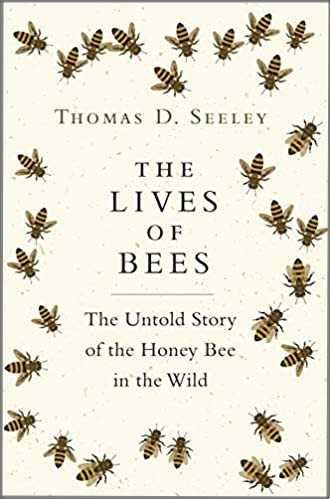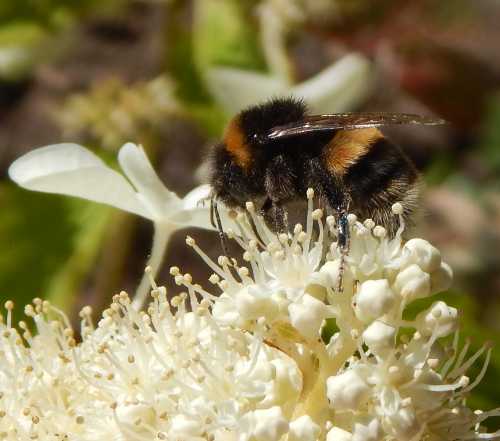Urban Beekeeping
Updated: 20th February 2020
Urban beekeeping has been on the rise, probably for a combination of reasons. People have ventured into beekeeping because they have heard about bee decline, and wanted to do something about it. This has, on some occasions, extended to businesses and even churches. In London, for example, St Paul’s Cathedral and the Museum of London have become home to several colonies of honey bees, with hives installed on the roofs. On the other hand, some people have an interest in producing honey and others have simply decided to pursue a hobby.
Whatever the reason, due to the fact that so many people live in towns and cities, its urban beekeeping or no beekeeping for many. However, whilst bees can thrive in towns and cities, urban beekeepers do need to take into account several issues particular to their environment, so if this is something you are contemplating, maybe you would like to think about the following points.
Urban Beekeeping And Considerations For Urban Beekeepers
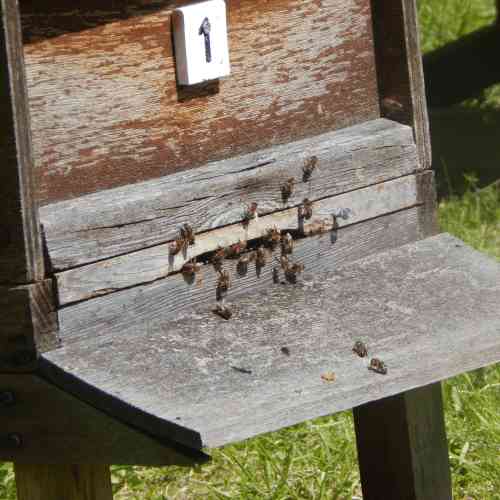
Temperament of the bees
The temperament of the bees you install in your hive of bee hives,
is something you should think about. Bees will go about there business, nevertheless, it may be better to opt for more passive strains. See types of honey bees.
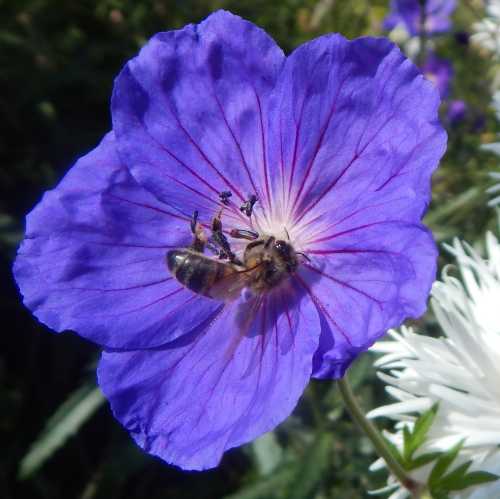 Honey bee on Geranium.
Honey bee on Geranium.
Regional authority restrictions
Is urban beekeeping allowed in the area in which you live?
For example, in some towns in the USA, there
are restrictions on beekeeping. If you
have a city allotment, you may have to negotiate with the body in charge of the
allotment (and even the other allotment holders).
Floral provision for bees
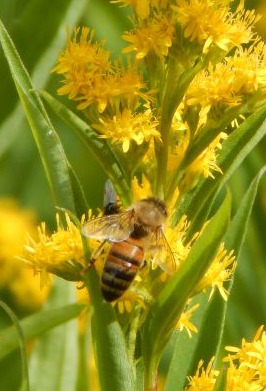 Honey bee on Solidago.
Honey bee on Solidago.Which leads to the next point: what kind of provision is there for the bees, in terms of flora?
Are there plenty of private gardens with an abundance of nectar and pollen-rich flowers? Are there sufficient flowering trees and hedgerow? Parks and public planting schemes can provide opportunities, but caution is advised if the local council uses insecticides such as neonicotinoid treatments.
Quality is important,
not merely quantity. Rows of highly
cultivated, brightly coloured annual flowers will be of little benefit.
Traditional single-petal flowers, herbs, and
nectar-rich flowering shrubs and trees are better (such as hawthorne, berberis
etc). They’ll need food from early
spring to autumn. You can even do your bit with
hanging baskets, window boxes and planters.
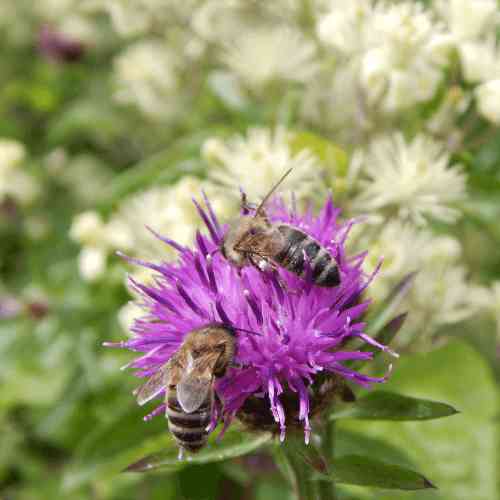 Honey bees on Knapweed.
Honey bees on Knapweed.Wildflowers on brownfield sites and waste areas may also provide food, but if you live in an area of rapid building development, some of these may disappear.
Vandalism
Potentially, vandalism could represent a barrier to urban beekeeping.
Are vandals likely to be a problem in your area? Unfortunately, if you live in an area with high levels of vandalism, depending on where the bees will be kept, it may be unwise to install hives, although some urban community projects successfully maintain and protect them.
Close to where I live, I heard of a proposal to install beehives in an area in an attempt to deter vandals from destroying ancient ruins. The plan was quickly abandoned when the inexperienced (albeit well-meaning) individuals realised there is nothing to stop vandals throwing bricks at hives from a distance, for example. ……Although I understand bee hives with colonies of honey bees are very effective for discouraging elephant crop raids in Africa! However, irresponsible vandals are a different matter.
Beekeeping support
Is there a local and active beekeeping association in the area?
If you are new to beekeeping, this may be very important for you. They would also be able to share advice and tips.
However, if you are venturing into urban beekeeping as a means to ‘do your bit’ for the bees, then speak with local beekeepers first – and perhaps even your local conservation body.
In 2010,
the Mayor of London, England came under criticism from the local beekeeping
organisations, for encouraging more beekeeping (see below):
“John Chapple, chair of the London
Beekeepers' Association, which has seen a five-fold increase to 150
members
in the past few years, said:
"London is already saturated with
beekeepers.
We don't need any more, what we need are better beekeepers.….Rather
than jumping on the beekeeping bandwagon, Boris [the Mayor] should stop
parks
from planting double-headed flowers that provide no nectar or pollen,
cutting
back trees and shrubs that provide vital forage for bees, and spraying
with
chemicals".
He added: "Londoners who
want to help bees would do better planting bee-friendly trees and
flowers and
lobbying for a more bee-friendly city, rather than keeping them."
Source: The Guardian; 16 December 2010.
http://www.theguardian.com/environment/2010/dec/16/boris-capital-bee-beekeepers-criticise
Your neighbours
What is the attitude of your neighbours? If they have young children (or even if they
don’t), they may be against you keeping bees for fear of being stung.
You may be able to allay their fears, and
take measures to discourage the bees from swarming, and you may be able to
erect a tall screen to encourage the bees to ‘fly high’.
However, if you are not able to come to some agreement with your neighbours, it may be better to find an alternative location for your hive – perhaps at an allotment (if you are permitted) or the garden of a friend with neighbours who are amenable to the idea of living next door to a honey bee colony. Note that some people do have very legitimate reasons for concern – severe allergy to bee stings is not common but can be fatal! It is also the case that some neighbours can merely be awkward.
Depending on where you live, it may be worth you checking what your rights and responsibilities are before investing your time, money and energy into keeping bees. This is another reason why linking up with other beekeepers in the area who are both knowledgeable and experienced, is so helpful.
Pollution
Pollution is another important issue to consider in urban beekeeping. If you have a small front yard facing a very busy road with the bees on the same level as all the petrol and diesel fumes, or next door to a factory churning out noxious fumes, again, you may be better off finding an alternative location to keep your bees. Research has shown that high pollution levels may impair foraging.
Also, if chemicals are used in the local park next
door (sprays, lawn treatments, and even insecticides applied to the soil), it may put your bees at risk.
Swarming bees
Are you comfortable and competent handling swarms, for instance if you are asked to remove a swarm from a tricky spot on your neighbour's property?
Storage
Urban properties are sometimes lacking in secure storage space. Do you have enough space for storing any beekeeping equipment you may
need?
A roof top bee hive?
A roof top can be an ideal place to put a hive, but
remember the hive will need protection from wind, and you will need good, safe
access to the hive. The hive will need to be stable, whatever the whether, and you'll need good access.
Conclusion
In summary, take a good look around first, consider your
skills, the assistance available to you from other beekeepers, and any
risks.
